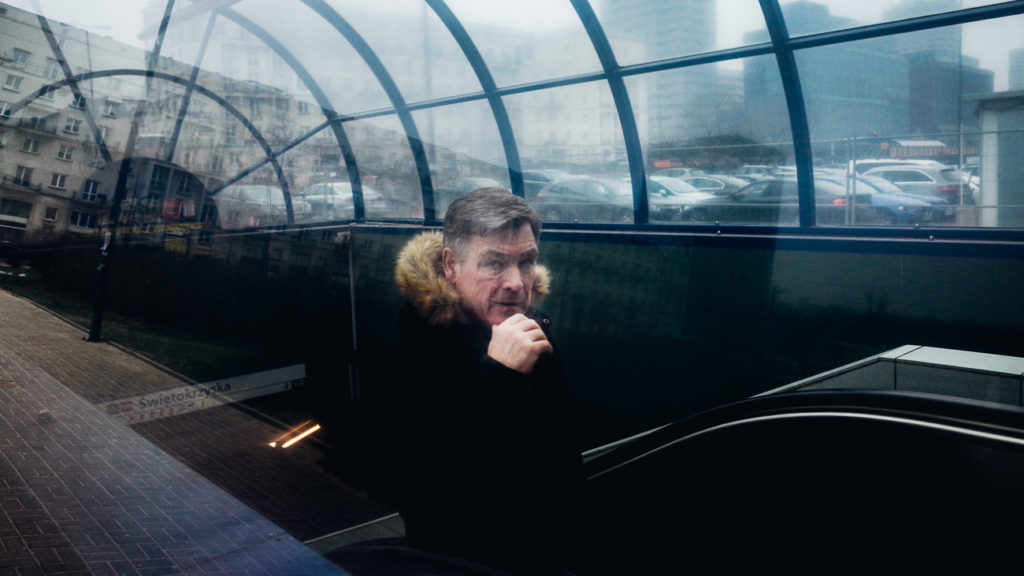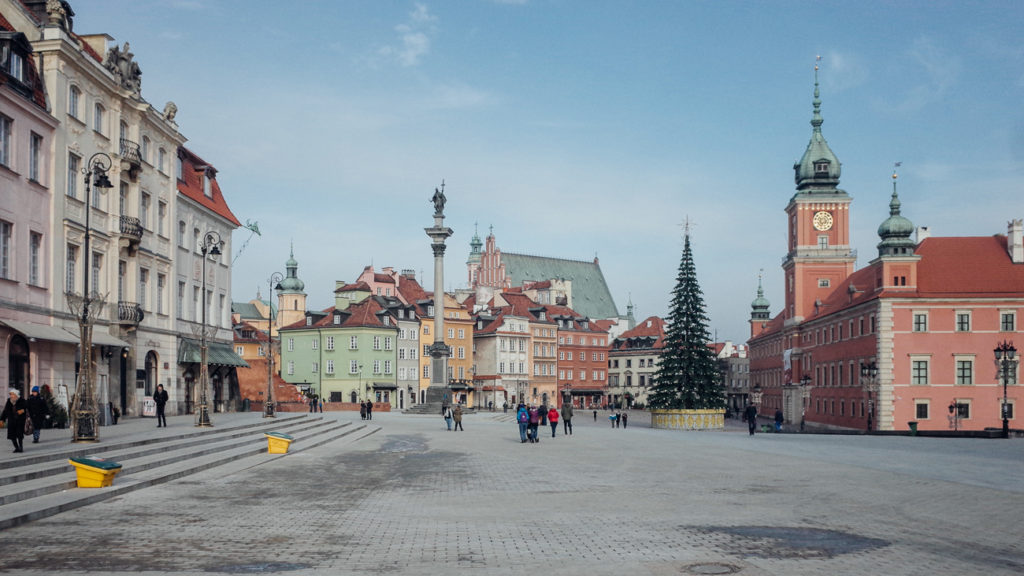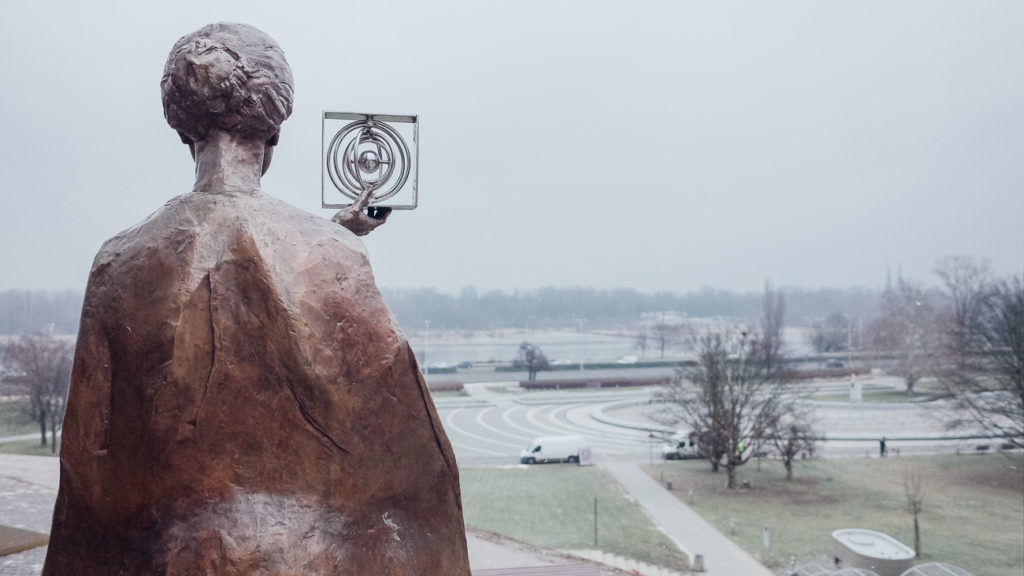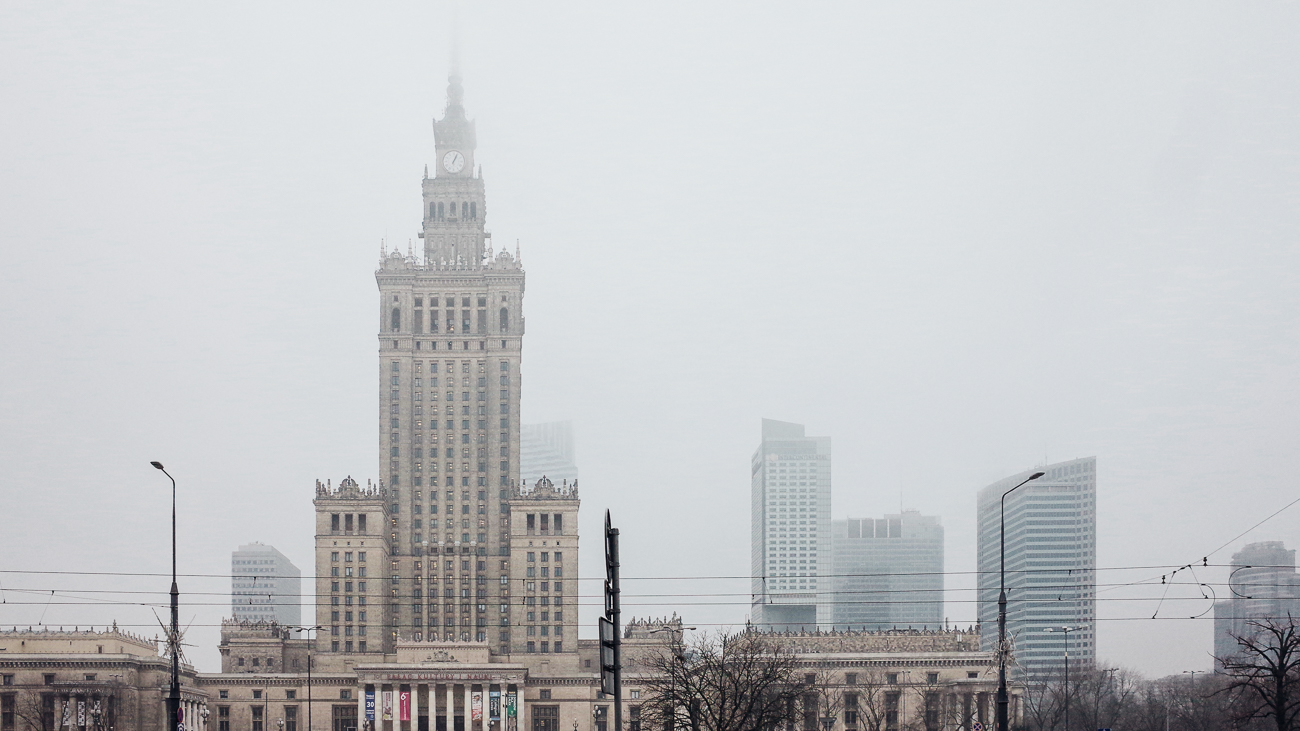Dear Barbara,
I arrived in Warsaw early in the evening. Unfortunately, it was already dark, and I couldn’t see that much out of the airplane window. But still, when I landed, I thought I could hear the beat from Chopin’s heart. You can feel a touch of History from the moment you step your foot here: the Warsaw Pact was signed in the city, while the Warsaw Ghetto Uprising resulted in the death of 13,000 Jews in 1943.
Arriving after sunset in a new destination is always odd: you somehow don’t get a first impression. The streets are dark, there is no horizon, the people seem sleepy. Actually, the absence of a first impression is the first impression. Whenever I arrived at night in a new place, I always had the feeling I didn’t travel at all. Sometimes I have the same feeling even when I travel at night to Athens or Berlin.
Sometimes I think that all that matters on a journey is the light.
I’m leaving now

A man in a uniform informs me that the taxi from the airport to the city center doesn’t have a fixed cost. “It might be 40 or 50 or 60 zlotys”, he says. “Whatever says the taximeter,” he adds. The moment I hear about the taximeter is the moment I decide to take the bus. I remember countless stories and taxi scams all over the world. I like taxis, but I don’t like being scammed. Recently in Minsk, I was asked five times more money for a ride. “No, thanks, I’ll take the bus,” I replied.
I head towards the bus station, and it’s only then that I realize how cold it really is. It’s -7 degrees, and it’s windy. I can feel the cold going through my bones like a knife. I’m waiting together with a very dense crowd for the bus No. 175. This is supposedly the bus to the city center. The bus arrives on time, and I embark on the front door. I ask the driver for a ticket, but he shakes his head negatively. He only says one single word: “Machine.” And then, he points his finger towards a red and yellow vending machine.
It seems that lately, I have problems issuing bus tickets. The same thing happened in Tallinn, and the same thing happens now. While the driver speeds up like there is no tomorrow, I try to hold myself and buy a ticket. When I find the right one, I realize that the “Machine” doesn’t accept cash. A woman next to me tries to find a solution. She thinks I have a credit card with me, but I tell her I don’t have one. Of course, I have one, but I want to see how this whole situation will unfold.
Soon, my ticket becomes the talk of the bus. One passenger proposes to buy one for me, but unfortunately, I have only banknotes. I can’t give him the exact money back, and he can’t give me change. Then, the woman that tried to find a solution says:
“I’m leaving now.”
“Um, okay, goodbye.”
“No, I’m leaving now,” she repeats.
“Hm. Do you mean you’re alive or that you will disembark?”
“I mean that I’m leaving now,” she says, and she gives me her ticket.
I thank her twice. While trying to see what the solution would be, I didn’t expect that. It’s not a huge gesture, but this is definitely an unexpected one. I didn’t have a first impression, but I had a cool second one.
It’s still Christmas in Warsaw

Although it’s late January when I arrive in Warsaw, the city is still decorated. It seems that Christmas is just around the corner, but the truth is that January is about to end. Catholicism seems really set the tone here.
I enter Zapiecek, an easy-going restaurant at Nowy Świat. The girls are dressed in traditional skirts, and the dumplings are delicious. I order wine, and while waiting for the food, I ask the waitress why the city is still illuminated.
“We love Christmas in Warsaw,” she says. “It’s the nicest time to be in the city even if it’s the coldest period.”
“Yeah, but we’re now almost a month after Christmas. Don’t you find it a bit too much?”
“Everything is a bit too much in Warsaw,” she replies.
Well, I have to search for the too-much-things-of-Warsaw. I look at the table next to me, and there sits a guy also eating alone. He had dumplings, and he’s now on his laptop. His face is all blue from the ambient light of the device. He’s typing and typing and typing. I thought he was a local, but when the waitress approaches him, he talks to her in English. The first thing he asks is: “Why do you still have Christmas decorations in Warsaw?” And, obviously, the girl replies: “We love Christmas in Warsaw.”
Suddenly, I feel like I’m part of a game, an infinite loop triggered by a single question. I space out, and I start having odd thoughts. Is this a game dictated by the city itself? This is not about Christmas in Warsaw; it’s about throwing bait to the visitors. The city will have Christmas decorations for so long that the foreigners will start to ask why this is happening. The waitresses in the traditional dresses are recording the questions, and they submit them to the authorities. Is this a psychometric test?
No. I just had too much wine.
Chopin’s heart in Warsaw

Frédéric Chopin is one of the most prominent Warsovians of all time. His presence in the city can be easily compared with Mozart’s presence in Salzburg. But unlike Mozart, Chopin has not been commercialized on the same scale. A walk around Warsaw resembles a walk around Chopin’s oeuvre: there is a statue, a museum as well, as several landmarks; Warsaw’s airport is named after him, too.
Chopin’s heart always belonged in Warsaw. He moved to Warsaw when he was 7, and he had there his first concert when he was 8. Although he lived half of his life in Paris and lived for a while in Mallorca, Chopin didn’t forget Warsaw. He actually had a weird request shortly before he died. He said that his heart should be taken out of his corpse and sent back to Warsaw. One might suppose that this was the bizarre idea of a hallucinating genius. Well, maybe it was.
The truth is, though, that Chopin’s heart was indeed removed from his corpse. And, of course, it was sent back to Warsaw. Chopin’s heart was transferred back to Poland by his sister, Ludwika. She used a jar for transportation, which was most likely full of Cognac. She somehow managed to get through customs and officials, and she brought Chopin’s heart to the Holy Church of Warsaw. Today there is a small monument in the church, and Chopin’s heart is still there.
As you can imagine, Chopin’s heart became some sort of treasure soon. And what always comes with treasure? Obsession. Naturally, there were a couple of incidents with Chopin’s heart. During World War II, the Nazis stole Chopin’s heart to hit the Polish’s morale. However, after the end of the war, they returned it. Chopin’s heart enjoyed some peaceful days after that incident.
However, in 2014 another odd incident took place. One night in April, thirteen people gathered in the Holy Church of Warsaw. Among them was the Minister of Culture, the Archbishop of Warsaw, and a couple of top scientists. There were concerns that the liquid preserving Chopin’s heart might have evaporated, which of course, meant that Chopin’s heart would dry out. What happened that night in 2014 is probably the most bizarre check-up of all times. The thirteen individuals exhumed Chopin’s heart and found that everything was okay.
Chopin is a prolific composer, but for Poland, he is something more: a saint.
A writer between Copernicus and Marie Curie

Two statues mark somehow the entrance and the exit of the old city. On one side is Copernicus holding a compass and an armillary sphere. His statue stands in front of the Polish Academy of Sciences. I spend some time in front of this statue because I want to see if Copernicus attracts still visitors. And indeed, several people stand before the statue and take photos.
Soon, I leave Copernicus behind, and I find myself at the beginning of the Old Town. It is a very cloudy and cold day, and there are just a few people walking there. Even in Rynek Square, which is still full of Christmassy ornaments, there are only a couple of tourists, and most of them are Greeks. I keep on walking until I end up at a point where I can see the Vistula river. This is a famous viewpoint as well as a cultural spot of Warsaw called the Multimedia Fountain Park.
The first thing I see is the back of a statue. This is Mary Curie, overlooking the River Vistula (in Polish: Wisła). Curie, a legendary scientist and the only woman to win the Nobel Prize twice, was fond of lonesome walks along the river. A couple of years before her death, she wrote: “I went alone on a walk towards the Wisła. There is a song from Kraków that says, whoever has fallen in love with the Polish waters, will love them until death. […] The river is so enchanting that I cannot even begin to describe it.”
And yet, while I walk all around Warsaw, entering and exiting the Old Town now and then, I have neither Curie nor Copernicus in mind. Seeing the fog that covers the tall buildings and the skyscrapers, I feel a sudden sympathy for the writers that search for lost paradises. And, eventually, I think of Isaac Bashevis Singer. Throughout Singer’s books, almost every evocation of a lost place is about Warsaw. Talking about one of his masterpieces, The Family Moskat, he said: “Warsaw has just now been destroyed. No one will ever see the Warsaw I knew. Let me just write about it. Let this Warsaw not disappear forever”.
I know that Chopin’s heart is still somehow beating in Warsaw. But, under that thick veil of fog, today, as I walk around Warsaw, I can only think of Isaac Bashevis Singer.
Requests and departures from Warsaw

I’m leaving Warsaw full of new historical perspectives. Yes, there are probably other cities where History is more present than in Warsaw. But what it’s also true is that in Warsaw, History requests your attention. It’s not just about the city’s prominent figures nor the churches; it’s not because of the brilliant Old Town either. What I really mean is that the city is built in a way that highlights its past. All the landmarks, all the people that left a mark in Warsaw, are present at all times.
Even on my way to the Central Train Station, when I tell the Uber driver about Singer, he tells me that “he knows someone who knows someone that was related to him.” But, unfortunately, he doesn’t remember more info. When the car stops outside the train station, the driver says: “You should not ignore the fact that all these people were born in Poland but became famous elsewhere.”
I haven’t realized that. I nod him goodbye, and I enter the station. I’m going to Krakow, a city that I failed twice to visit because I was both times sick. I have a cold now too, but I promised myself that this time I would visit Krakow. While searching for the platform, I imagine all those famous Poles leaving for abroad. They worked and became part of the diaspora. Some of them never saw Poland and Warsaw again.
Departing, succeeding, and never returning. I wonder what this meant to them. Under another prism, History didn’t request their attention. Instead, they requested History’s attention passionately -and they got it.
I’ll write to you from Krakow.
George
More about Warsaw: Things to do in Warsaw
More about Poland: Charming Poznan & Why, Krakow?
*Get my FREE Travel Writing Course*
Buy the camera I use | Book your hotel
Pin it for later

Please share, tweet, and pin if you enjoyed reading Chopin’s heart in Warsaw. Your support keeps this website running and all the info up-to-date. 🙂
Last Updated on November 11, 2020 by George Pavlopoulos
